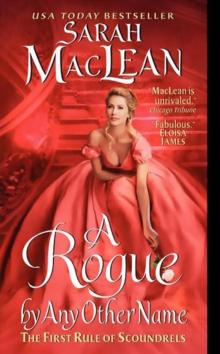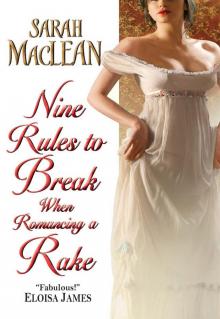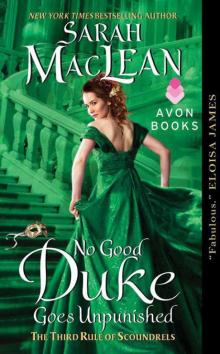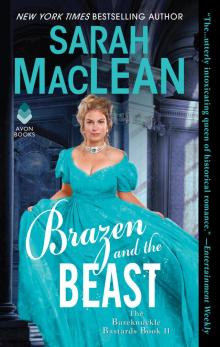- Home
- Sarah MacLean
The Day of the Duchess Page 2
The Day of the Duchess Read online
Page 2
Knowing that, despite his virtually limitless wealth and power and position, he could not bring her back. And when he had been able to think beyond grief, he’d found solace in fury.
He would not lose them both.
Malcolm’s gaze narrowed on the surgeon. “You misunderstand.” He reached for the doctor, unable to stop himself. Lifting him by the lapels of his coat, the duke rained thunder down on the older, smaller, weaker man. “Do you hear me? She lives.” The surgeon stuttered, and rage flooded Malcolm. He shook the doctor again. “My wife lives.”
“I—I cannot save her if she will not be saved.”
Malcolm let go, not caring that the surgeon stumbled when he hit the floor. He was already headed for Sera, coming to his knees at her bedside, taking her hand in his, loathing the cold in it, tightening his grip, willing her warm. He took a moment to look at her—she’d been gone for so long, and before that, he’d hated her too much. And before that, he’d been too desperate to notice what precisely he desired about her.
How was it that it took until now—until she was pale and still and on the edge of death—for him to realize how beautiful she was? Her high cheekbones and her full lips, and those sooty black lashes, impossibly long where they lay on her porcelain skin.
What would he give to have her lift those lashes? To look at him with those eyes that never failed to steal his breath, blue as the summer sky. He’d take them however they came—filled with happiness. With sorrow. With hatred.
He’d already given so much. So had she. What more did he have? What meager sacrifice could he offer? None. And so, in this, he would take without payment. He closed his eyes and pressed his lips to her cold fingers, limp and unmoving. “You shall live, Sera. If I have to pull you back from heaven itself. You shall live.”
“Your Grace.”
He stilled at the words, clear and emotionless, spoken from the door to the chamber. He did not turn to face the woman who stood there; he could not find the patience for it.
His mother’s skirts rustled as she drew closer. “Haven.”
Fury threaded through him at the title here, in this moment. Always a duke, never a man. How often had she reminded him of his place? Of his purpose? Of the sacrifices she’d made to ensure it for him? Sacrifices that made her one of the most feared women in Britain. A cut from the Duchess of Haven could ruin a girl before she’d even had a chance.
Not duchess. Dowager.
Malcolm stood, turning to face his mother, blocking her view of Seraphina. Suddenly, keenly, wanting her out of this room. Away from his wife.
He brushed past the older woman and the surgeon, pushing into the hallway beyond, sending maids scattering from their bent heads and hushed whispers. He swallowed the urge to bellow after them. To go against decades of training in title and position.
“You are being dramatic,” she said. The greatest of all sins.
His heart began to pound. “My child is dead. My wife nearly so.” Her gaze did not warm. He should not have been surprised by the fact, and yet it made him want to rage. But dukes did not rage. Instead, he met her cool blue gaze and said, “Your grandchild is dead.”
“A girl.”
Heat threaded through him. “A daughter.”
“Not an heir,” she pointed out, with cool dismissal. “And now, if you are lucky, you can begin again.”
The heat became fire, rioting through him. Clawing up his throat. Suffocating. “If I am lucky?”
“If the Talbot girl dies. The doctor says that if she lives, she will be barren, and so she shall no longer be of use. You can find another. Produce an heir. One with better pedigree.”
His gaze narrowed, the words difficult to understand over the roar in his ears. “She is Duchess of Haven.”
“The title means nothing if she cannot produce the next duke. That’s why you married her, is it not? She and her mother set a trap. Caught you. Kept you with the promise of an heir. And now it’s gone. I would be less of a mother if I did not wish you free of such a cheap woman.”
He chose his words carefully. “In this moment, you could not be less of a mother. You are a cold, heartless bitch. And I want you gone from this house when I return.”
She raised one elegant brow. “Emotion does not become you.”
He left his mother then, because he did not trust himself not to unleash every ounce of his unbecoming emotions upon her.
He left his mother and went to bury his daughter in the cold January ground, all the while praying that his wife would live.
When she woke, Sera was alone, in a room filled with blinding light. She ached everywhere—in bones and muscles and in places she could not name. In the place that had been so beautifully full of something more than hope, and was now so devastatingly empty of it.
She moved her hand on the counterpane, her fingers tracing over the softly worked, pristine linen to her stomach, tender and swollen and vacant. A tear spilled, racing down her temple, leaving a trail of loneliness as it slipped into her hair and disappeared. She imagined that it carried the last shred of her happiness.
Beyond the window, bright blue sky shimmered, clouded by nothing but the heavy glass panes. A bare tree branch in the distance appeared malformed, great black blotches upon it.
Not malformation. Crows.
One for sorrow. Two for mirth.
Her breath hitched in her throat.
“Tears won’t bring it back.”
Sera turned toward the voice, dreading what she would find there. Not her husband, but her mother-in-law, who seemed to make a practice of inhabiting rooms in which she was not welcome. Indeed, the Dowager Duchess of Haven was regularly present in the worst of rooms. The ones that destroyed dreams. The woman was a harbinger of sorrow. Even if Sera hadn’t known in her soul that the child was gone, the presence of the dowager proved it.
Sera looked away to the window, to the sky beyond, bright and full of stolen promise. To the crows.
Three for a wedding. Four for a birth.
She did not speak. She could not find the words, and even if she could, she was not interested in sharing them with the other woman.
The dowager found enough words for both of them, however, drawing closer, speaking as though about the weather. “You might not like me, Seraphina, but you would do well to listen.”
Sera did not move.
“We are not that different, you and I,” the older woman said. “We both made a mistake trapping a man in marriage. The difference is that my child survived.” She paused, and Sera willed her to leave the room, suddenly exhausted by the dowager’s very presence. “If he hadn’t, I would have run.”
Running was a glorious thought.
Could she outrun it? The sorrow? The pain? Could she outrun him?
“There was no love lost in our marriage. Just as there is none lost in yours.”
She was wrong, of course. Sera’s marriage was all love lost. And now, as she lay alone in this blindingly white bed in this blindingly white room in this oppressively daunting home, she knew that her marriage would never be love regained.
Because there would never be love again. Not for Malcolm. Not for their child. Not for herself. She was alone in this room and in this life.
If only she could run. But he’d stolen her freedom just as well as he’d stolen her heart. And her happiness. And her future.
“You are barren.”
Sera felt nothing at the words, which held no meaning in the moment. She did not care for the news of future, fantasy children, only for that of the child she’d lost. The child they had lost.
“He will need an heir.”
He did not wish one. Hadn’t he made it clear?
His mother either did not know, or did not care. “You cannot give it to him. Someone else can.”
Sera looked away.
“If you wished it, I could help you.”
She looked to her mother-in-law, into grey-blue eyes cold as the woman’s soul. Sera did not pretend to misu
nderstand. She knew that her disappearance was all this hateful woman had ever wanted. The dowager had loathed Sera from the start—hated the circumstances of her birth, her father a commoner who had bought his way into the aristocracy and her mother, willing to do anything to climb, who had clawed her way up, crowing to all who would hear that her eldest had captured a duke.
Of course, Sera had believed him caught. Believed him hers. Wished it beyond measure.
But this woman—this cold, aging woman—had made sure that was never to be. In spite of the promise of a child. Because of it.
Until this moment, Sera had planned to stay. To win her husband’s forgiveness. To defy the dowager’s fury. But that was before. That was when she thought they might one day be a family.
When she had still harbored dreams of happiness.
Now, she knew better.
Thick skirts rustled as the other woman drew nearer. “You could run. Begin anew. Let him do the same.”
It was madness. And still, she could not stop herself from saying, “What of our marriage?”
A muscle twitched at the edge of the dowager’s lips. She sensed triumph. “Money buys everything. Including annulment.”
Sera looked to the crows outside. Five for silver. Six for gold.
The dowager continued. “The absence of children will ease the way.”
The words were a cold, quiet torture.
The absence of their child would never be easy.
“Name your price,” the dowager whispered.
Sera was silent, watching the door behind the older woman, willing it to open. Willing her husband to return, filled with the aching sadness that consumed her. Desperate to mourn their child. Their past. Their future.
Willing to forgive her.
Willing to ask for forgiveness.
The mahogany door remained firmly shut.
He didn’t wish it, and so why should she? Why shouldn’t she close a door herself? Why shouldn’t she choose a new path?
How much to do it? How much for a future? How much to run? How much for a life, alone, pale in comparison to the one she’d been promised?
Alone, but hers.
She whispered the exorbitant number. Enough to leave. Never enough to forget.
Seven for a secret never to be told.
Chapter 3
Difficult Duchess Demands Divorce!
August 19, 1836
House of Lords, Parliament
He was as handsome as he’d ever been. She didn’t know why she’d expected him to be otherwise—it had been three years, not thirty—but she had. Or perhaps not expected, but hoped. She’d harbored some small, secret dream that he’d be less perfect. Less handsome. Less, full stop.
But he wasn’t less. If anything, he was more.
His face more angular, his gaze more consuming, he was even taller than she remembered. And so handsome, even as he came toward her, dressed in ancient parliamentary robes and the inane powdered wig that should have made him look like a child playing at fancy dress and instead made him look a man with a purpose.
Namely, removing her from the floor of the House of Lords.
He parted the similarly garishly appointed members of Parliament like a red velvet sea, encouraged by the hoots and jeers of those assembled aristocrats whose disdain she knew all too well from her former life. Men who could ruin a woman in a heartbeat. Destroy a family and a future. And do it all without thinking twice.
She’d loathed them all, and him the most.
But not for long.
She planned to put the loathing behind her now that she’d returned, ready to forget him. She’d imagined this moment for months, since before she’d returned to Britain, the entire plan designed to infuriate him to the point of agreeing to the dissolution of their marriage. For, if there was anything Haven loathed in the world, it was being played the fool.
Had that not been their demise at the start?
He approached, the massive chamber falling away along with the years. She’d been haunted by his eyes. Somehow not brown, not green, not gold, not grey, and somehow all of them at once. Fascinating and full of secrets. The kind of eyes that might steal a woman’s wits if she wasn’t careful.
Sera was careful, now.
Careful, and smart. She resisted the urge to back away from him, simultaneously afraid of what might happen if he touched her, and determined never to cow to him. Never to run from him again.
She was not the woman she had been when she’d left. She was returned with a singular promise to herself; when she left him this time, she would do so with pride. With purpose. With a future.
She had plans. And these men would not stop her.
And so it was that London’s most powerful, assembled for the final day of the parliamentary session, witnessed Seraphina, Duchess of Haven’s winning smile as she faced the duke of the same name for the first time in two years and seven months. Exactly. “Husband.”
Another woman might not have noticed the slight narrowing of his eyes, the barely-there flare of his nose, the nearly imperceptible clenching of his square jaw. But Sera had once spent the better part of a year fascinated by the way this proud, unflappable man revealed himself in the infinitesimal. He was angry. Good.
“Then you remember me.” The words were quiet and sharp. Of course she remembered. No matter how well she tried, she seemed unable to forget.
And she had tried.
She lifted her chin, keenly aware of their audience, and slung her arrow. “Don’t fret, darling. I predict we shan’t need to remember each other for long.”
“You are making a spectacle of yourself.”
She allowed her smile to widen. “You say that as though it is a bad thing.”
One brow rose, superior as ever. “You are making a spectacle of me.”
She did not waver. “You say that as though you do not deserve it.”
She didn’t expect him to reach for her, or she would have been prepared for what came when his fingers wrapped around her elbow, firm and warm and somehow unexpectedly gentle. Would have steeled herself for the assault of too long ago memories.
I’ve never felt anything like this.
She resisted the memory and slid her arm from his grip with a graceful force that he would feel and no one watching would ever notice. The duke had no choice but to let her go, even as he lowered his voice and spoke, the words barely there. “Who are you?”
It was her brow that rose this time. “You do not recognize me?”
“Not this incarnation, no.”
Incarnation. It was not the wrong word, for she had been reincarnated. That was what happened to those who died and returned. It had felt like death, just as this morning, in this place, in all its heat and rancid stench made worse by the assembly of pompous masculinity, felt somehow, remarkably, like life once more.
“I could not taste freedom then.”
His lips flattened. Before he could reply, a man shouted from the assembly beyond. “Oi! Haven! The chit’s not allowed on the floor!”
Sera turned to the man. “My Lord Earl, I believe you meant to address me as Duchess.”
The men assembled harrumphed and grumbled as the earl in question—now sporting scarlet ears—spoke to Haven. “Control your female.”
Sera returned her attention to her husband, but did not lower her voice. “It is impressive that he believes you are able to do such a thing.”
Her husband’s eyes narrowed and Sera’s heart began to pound. She recognized the look. An animal, challenged.
Let him come for her. She, too, had teeth.
“My offices. Now.”
“And if I refuse?” She saw him realize her power. How many other wives could stand here, before God and husband and the House of Lords, and hold sway without fear of repercussions?
That was the secret, of course. If one did not fear ruin, one could not be threatened with it. As Sera had seen ruin in all its forms, had faced it and survived it, she did not fear it,
and so he could not harm her. She’d been gone from London for nearly three years, her reputation in tatters long before she’d set foot in the carriage that had carried her away from the Haven estate on that long ago winter’s day. It was remarkable, the power one held when one had nothing to lose.
At least, when one was thought to have nothing to lose.
And so she stood before the most powerful assembly in Britain, toe-to-toe with her husband, who had always held sway over her. Over her heart, and her hand, and her body, and her identity. Equals at long last. And she waited for him to make his move.
She did not expect him to smirk. “You shan’t refuse.”
“Why not?” she asked, uncertainty flaring, though she’d be damned if she’d show it.
“Because if you want a divorce, you will require my assistance to get it.”
Her heart began to pound. Would he give it to her? The divorce? The freedom? Could it be so simple? Excitement flared. And triumph. And something else, something she did not wish to think on. Instead, she waved an arm in an exaggerated flourish. “By all means, Your Grace. Lead the way.”
They left the main hall of the House of Lords to a cacophony of distaste and judgment. In the quiet hallway beyond, Haven came even with her and said, softly, “Was it worth the embarrassment? That scene?”
“You misjudge me if you believe me embarrassed by the opinions of those men,” she replied. “I’ve suffered them before, and will again.”
“And again and again if you get what you wish.”
He meant the divorce. That she would never again receive social approval. He could not see that she did not care. “You mean, when I get it.”
He stopped at a massive door, designed to loom and impress, and opened it, revealing the extravagant suite beyond, one reserved for the handful of dukes who chose to keep space at the House of Lords. The room was expansive and overwhelming, mahogany and leather and gilt, every surface inscribed with privilege and power.
She stepped inside, unable to avoid brushing past him, hating the way the barely-there touch rioted through her. And that was before the memories came.

 A Rogue by Any Other Name
A Rogue by Any Other Name One Good Earl Deserves a Lover
One Good Earl Deserves a Lover Ten Ways to Be Adored When Landing a Lord
Ten Ways to Be Adored When Landing a Lord Nine Rules to Break When Romancing a Rake
Nine Rules to Break When Romancing a Rake A Duke Worth Falling For
A Duke Worth Falling For No Good Duke Goes Unpunished
No Good Duke Goes Unpunished Brazen and the Beast
Brazen and the Beast Never Judge a Lady by Her Cover
Never Judge a Lady by Her Cover Wicked and the Wallflower
Wicked and the Wallflower The Rogue Not Taken
The Rogue Not Taken Bombshell
Bombshell A Scot in the Dark
A Scot in the Dark Eleven Scandals to Start to Win a Duke's Heart
Eleven Scandals to Start to Win a Duke's Heart Naughty Brits: An Anthology
Naughty Brits: An Anthology The Day of the Duchess
The Day of the Duchess Never Judge a Lady By Her Cover: Number 4 in series (The Rules of Scoundrels series)
Never Judge a Lady By Her Cover: Number 4 in series (The Rules of Scoundrels series) Wicked and the Wallflower: Bareknuckle Bastards Book 1
Wicked and the Wallflower: Bareknuckle Bastards Book 1 Never Judge a Lady by Her Cover_The Fourth Rule of Scoundrels
Never Judge a Lady by Her Cover_The Fourth Rule of Scoundrels